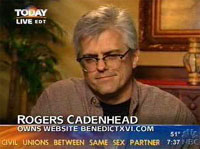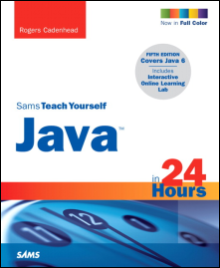And Now You Want to Be My Friend on Facebook?
I was poking around Google Reader when I found a recommended six-month-old blog post by Google engineer Mark Chu-Carroll on why he will not be attending his high school reunion:
... it's twenty five years since I got out of that miserable ------- hell-hole. And people from my high school class are suddenly getting in touch, sending me email, trying to friend me on Facebook, and trying to convince me to bring my family to the reunion. (It's a picnic reunion, full family invited.) Even some of the people who used to beat the crap out of me on a regular basis are getting in touch as if we're old friends. ...
Stay the ---- away from me. I don't want to hear about your lives. I don't want to know how you've changed since high school. I don't want to hear about your jobs, your spouses, your children. I've got a good life now, and I cannot imagine a reason in the world why I would pollute that world with contact with any of you.
Chu-Carroll describes in his post and subsequent comments how his fingers were broken by a bully and a swastika was once burned into his lawn while he attended a suburban New Jersey high school in the '80s. He received hundreds of responses to his post, including one that recommended an appropriate song by the Australian singer Kate Miller-Heidke:
You can hear a better audio version on her iLike page. I think my favorite genre of music is antisocial piano rock. Last fall, Miller-Heidke toured the U.S. as the opening act for the master of the form, Ben Folds.
Why Leslie Harpold's Sites Disappeared
Leslie had a special kind of magic. But today there's no trace of her sites.
As long as those sites were up, her brand of humanity was alive, pure, unedited and quenching. The availability of her writing made her slightly less absent. Sad isn't really an appropriate construct for missing Leslie. And sappy sentimentality wouldn't please her at all.
But that writing should remain on the Internet. Those sites should never come down. They belong here like Leslie belonged here. Immortal.
-- a comment by Liria Mersini
A little over three years ago, the web designer and online essayist Leslie Harpold died at age 40. Leslie was a friend of mine, part of a circle of early web creators who discovered the medium as it was blossoming in the mid-'90s. We hung out together on a private mailing list for a decade watching the web (and ourselves) grow up. Leslie left behind a vast body of online work in the form of essays, web sites, weblog entries and photos.
Since that time, almost all of it has disappeared.
 Leslie's family allowed her domains smug.com, harpold.com and others to expire and politely turned down all requests to mirror her sites. Several of her friends, including me, had offered after her death to pay the costs required to keep them online.
Leslie's family allowed her domains smug.com, harpold.com and others to expire and politely turned down all requests to mirror her sites. Several of her friends, including me, had offered after her death to pay the costs required to keep them online.
The recent death of Brad Graham, another early web publisher, has renewed interest in the fate of Leslie's work. I sent an email yesterday to Leslie's niece, asking if it would be possible for some of her friends to reprint her work as a book and web site. Today I heard back. They will not allow anything to be republished. Because I've been told that some of her writings might be a sensitive issue for her family, I replied to her niece that if this is indeed the case, those particular works could be excluded from reprint.
This did not go over well.
I was told that it's none of my business why her family doesn't want her work republished, which is absolutely true, and that her legacy "is not dependent on websites or books; her legacy is with every person who knew her and loved her." This is only partially true. Leslie was an early pioneer in the creation of autobiographical content and experimental web design. She left behind thousands of web pages, many of which are as memorable as Possible Scenarios for Heaven from 2003.
Leslie's family appears to have decided to let her entire body of work disappear and be forgotten completely. The only things that are left online are articles she wrote for other sites, such as The Morning News.
This raises an important question for those of us who create work on the web that we publish ourselves. When heirs decide to bury a web creator's body of work by shuttering sites and rejecting all republication requests, can anything be done to save the material?
If the heirs of Charles Dickens had decided that his novels were not his legacy, they could have spurned all publishers and let the books fall out of print, but the existing copies would not have vanished entirely. There still would be physical copies of the books to read and some would've survived long enough to fall into the public domain.
For works created on the web, however, the only thing keeping them around is an active publisher or a copyright license that permits others to reprint the material. A copyright holder who wanted a web site to disappear completely could take it offline, demand its removal from all archives and never allow republication. Leslie's work will not begin passing into the public domain until 2065.
Perhaps this is the way it should be. No one has found an email or web page where Leslie stipulated her desires for her work in the event of her death, leaving the decision to her heirs.
But everything I learned about Leslie over the years tells me that she'd want this part of her to survive.
Danish Cartoonist Left Child Outside Panic Room
Last week, the Danish cartoonist Kurt Westergaard was confronted at home by an axe-wielding intruder enraged by his depiction of Muhammad. Initial media reports indicated that the 74-year-old and his five-year-old granddaughter Stephanie fled to the safety of a "panic room" in his home and alerted police, who arrived within minutes and shot the intruder.
Yesterday, news reports revealed that Westergaard fled to the panic room without his granddaughter:
At the time, Westergaard was looking after his five-year-old granddaughter, Stephanie. He was confronted with a terrible choice: risk being killed in front of his granddaughter, or trust that the PET, Denmark's security and intelligence service, knew what they were talking about when they had told him terrorists usually don't harm family members but stick to their target.
Westergaard chose to escape into his bathroom, which had been specially fortified as a "panic room", while Stephanie was left sitting in the living room. From the bathroom he alerted the police as his assailant reportedly battered the reinforced door with the axe, shouting, "We will get our revenge!"
"Those minutes were horrible," Westergaard recalled yesterday. "But I think I have got through this fairly well -- and so, it seems, did my grandchild.
Westergaard has given several different explanations for his decision to hide without the child. He told the Copenhagen Post that he was trying to draw the intruder away from the child and said to another paper that he didn't have time to get her.
Regardless of his rationale, I can't think of a any reason I'd lock myself in a secure room while leaving a young child outside with an intruder. She could've been kidnapped, attacked or threatened as a means to get him out.
We're having a lively debate about this on the Drudge Retort, where the only thing we can agree on is this: If your dad requires constant security because of death threats, he's a poor choice for babysitter.
My Life as a Religious Parable
Rick Brown, a preacher for ChristBridge Fellowship in Tomball, Texas, used me as the subject of a sermon printed in the local newspaper this week:
When Pope John Paul died Rogers Cadenhead quickly registered www.BenedictXVI.com thinking this might be the name chosen by the new pope. When Cardinal Ratzinger was elected Pope he did choose the name Pope Benedict XVI, causing many to question what the Vatican would do to get the rights to that domain name.
Cadenhead didn't ask the Vatican for money. Instead, in a humorous manner on his blog he suggested a few things he would trade for:
1. Three days, two nights at the Vatican hotel.
2. One of those hats (referring to the bishop's hat).
3. Complete absolution, no questions asked, for the third week of March 1987.
Wonder what Rogers did the third week of March in 1987? Me too. Most of us have at least a week we'd like total forgiveness for.
Since my 15 minutes of fame as the popesquatter in 2005, I've become a religious parable. A couple times a year I'm mentioned in sermons. I've turned up in churches, a syndicated radio broadcast and the book Facing Your Giants: A David and Goliath Story for Everyday People. In English, German and Spanish.
 A few years ago, my sister-in-law Trish and her family were looking for a new church to join near Purdue in Indiana, so they went to a house of worship they'd never been to before. As they listened to the sermon, the pastor mentioned my name.
A few years ago, my sister-in-law Trish and her family were looking for a new church to join near Purdue in Indiana, so they went to a house of worship they'd never been to before. As they listened to the sermon, the pastor mentioned my name.
Like the Tomball preacher, the pastor told the story of benedictxvi.com and my request for absolution, inviting the congregation to ponder what I did that week which required papal indulgence.
Afterwards, Trish met the pastor and she sheepishly told him exactly what I'd done:
Her younger sister.
Anil Dash is Wrong About Treehouse Clubs
In a post about how the Twitter API is becoming a de facto standard, Anil Dash derides the impulse of groups to work together to create web standards:
The natural inclination right now for geeks of a certain type is to start dreaming up new standards bodies, or how they can participate in the Open Web Foundation to make a Super Awesome Twitter API Evolution Committee. Here's my recommendation: Don't. Don't do any of that ----, and don't run off to make membership badges for the Treehouse Club quite yet. Instead, just iterate and ship. ...
The good news is, consensus around evolution of the Twitter API can happen simply by saying to each other, "If two application developers who share no common investors or board members can reach agreement around an extension to the API, and between them they have a significant enough number of users to be relevant, then we should all just adopt their work."
This is important because it reframes the conversation from being about technical merits, and all the boys who like to play with APIs always think they know what's "better". I'm sure if I wanted to waste an afternoon, I could tell you a dozen ways in which the Twitter API could be "improved". But guess what? That ---- does not matter. Adoption matters, and I'm heartened by the fact that people seem to be getting that.
As he suggested in our prior discussion of RSSCloud, which currently is being revised unilaterally by one person with no public process to ensure its soundness, Dash believes there's value in "simple, human-readable but potentially ambiguous specs."
I used to think that too, but after spending so many years involved with RSS, I have a better understanding of the costs that developers incur because of half-assed specs. During the 18 months in which the RSS Advisory Board drafted the RSS Best Practices Profile, we accumulated more information on how RSS has been implemented than anybody else on the planet. It's never a good thing for a specification to be "potentially ambiguous." If two developers disagree on what a spec means, their software will not interoperate. And once their software ships, they'll be mad as hell if the specification is revised to make their interpretation the incorrect one.
This leaves you with a situation where you know that a spec is confusing people, and you know that developers are implementing it in incompatible ways, but the most you can do is offer advice like this:
Support for the enclosure element in RSS software varies significantly because of disagreement over whether the specification permits more than one enclosure per item. Although the author intended to permit no more than one enclosure in each item, this limit is not explicit in the specification.
Blogware, Movable Type and WordPress enable publishers to include multiple enclosures in each item of their RSS documents. This works successfully in some aggregators, including BottomFeeder, FeederReader, NewsGator and Safari.
Other software does not support multiple enclosures, including Bloglines, FeedDemon, Google Reader and Microsoft Internet Explorer 7. The first enclosure is downloaded automatically, an aspect of enclosure support relied on in podcasting, and the additional enclosures are either ignored or must be requested manually.
For best support in the widest number of aggregators, an item SHOULD NOT contain more than one enclosure.
So when somebody asks me if an RSS item can contain more than one enclosure, I give that long-winded answer. When I'm asked the same question about Atom, the answer is this:
Yes.
Guess which one was created by a Treehouse Club?
Dash's vision of a Twitter API that evolves every time two developers agree on a new feature would rapidly devolve into an unworkable mess.
Book Giveaway: Teach Yourself Java in 24 Hours
My newest book, Sams Teach Yourself Java in 24 Hours, Fifth Edition, recently hit bookstores. The book is a for-absolute-beginners guide to programming Java, and this section from chapter one's Q&A section shows how much license I get from the publisher to have fun with the series:
Q. Do you only answer questions about Java?
A. Not at all. Ask me anything.
Q. Okay, why is Prince mad at the Foo Fighters?
A. Prince is unhappy that the Foo Fighters performed a cover of his song "Darling Nikki" and released it as a B-side single in Australia. He told Entertainment Weekly they should write their own tunes and wouldn't let the band release it in the United States. This became a pretty meaningless distinction as the song became a radio hit around the globe and was played regularly during their concerts.
When Prince performed at Super Bowl XLI a few years later, he covered the Foo Fighters' "Best of You," an artistic decision that surprised the Foo Fighters as much as everybody else.
"It was pretty amazing to have a guy like Prince covering one of our songs," Foo Fighters drummer Taylor Hawkins told MTV, "and actually doing it better than we did."
Although playing someone else's music is an odd way to exercise a grudge, this was a better option for the 5-foot-2 Prince than challenging the band to a fight.
Every chapter ends with one reader question that has bupkiss to do with Java. I used to be the Fort Worth Star-Telegram's Ed Brice, an answer man who fielded random questions, so old habits die hard.
 My book has been fully updated for Java 6 and has new chapters on JAX-WS and game programming. I have 20 copies I'd like to give to people who want to learn Java, and there's still time for me to mail them before Christmas.
My book has been fully updated for Java 6 and has new chapters on JAX-WS and game programming. I have 20 copies I'd like to give to people who want to learn Java, and there's still time for me to mail them before Christmas.
If you know someone who wants to learn Java, or you can make a convincing case for why Santa owes you this book after the year 2009 you just endured, please leave a comment here on Workbench or in a Twitter post to rcade. Make sure I have some means of contacting you, so I can get the address of the person getting the book.
I'm planning on mailing these out on Wednesday morning in the pre-Christmas scrum at the post office. I will mail the books directly to the people receiving them and can put your name and address as the sender and wrap them if necessary. No one needs to know I was involved.
Please note that I'm expecting the people who get this free book to teach themselves Java in a single contiguous 24-hour period. For too long, Sams has coddled readers who devote one hour a day to a subject and learn it at their leisure.
Homeless Man Performs Radiohead's 'Creep'
On Friday, the Opie and Anthony radio show invited several homeless men they pulled off the street into the studio to promote their annual "homeless shopping spree" bit. When they learned one of the men was a musician who had written some songs, they procured him a guitar and he performed Radiohead's "Creep."
There's more details on Daniel Mustard's appearance on Sports Inferno and Reddit.

